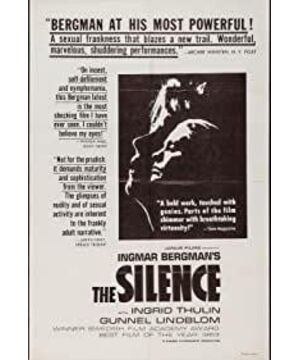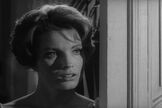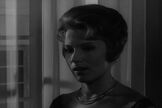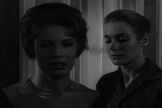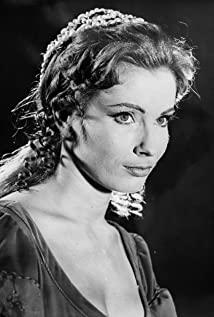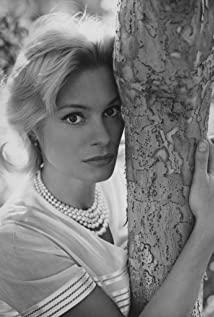On the train, two women and a boy were staying in a compartment. It was an unpleasant journey, and we could feel the mutual disgust and tension between women. The boy wandered into the corridor, looked at the other passengers, and saw another train passing by with armored tanks on board. The train stopped in an unknown city, and three people checked in at a hotel. In this way, Bergman started the third part of his trilogy of God's Silence-"Silence" (1963). If "Winter Light" refers directly to the silence of God, and "Still in the Mirror" implies the silence of God, then "Silence" has no theological existence at all-there is only a world abandoned by God.
Through dialogue, we indirectly learn about these characters, and a conversation with their father revealed their sisterhood. Sister Ester (Ingrid Turing) is a translator, a person who looks severe, painful and disappointed. She is dying. Sister Anna (Gunell Lindblom) looks younger and sexier, and is impatient with this trip. Although they were obviously going home, there was no sign of where they came from, why they went there, or where they were. Even Ester doesn't recognize the language here, and it is strange that the concierge in a large hotel in Europe speaks neither German nor English.
The boy Johan (Jörgen Lindström) is underage. He has an angelic face and is pure in nature. He is Anna's son, but apparently has lived between two disagreeable sisters for a long time. The reason for their disharmony has never been specified, but it is clear that there has been a estrangement since childhood, and these past events implicitly involve their father. Now that Ester is dying, Anna has no sympathy for her, but instead claims to go outside to find a one-night stand (for some reason we can understand), or at least to show her her unfaithful behavior.
The film appears to be hidden, and most of the story is hidden between the lines in the dialogue. Here I try to analyze the film: Anna has sex with a man in the hotel, which represents the body. Ester works and reads books in the room, which represents thought. The door separating the two people's room was the entrance and exit for their competition, and only Johan could shuttle back and forth without hesitation.
I think the boy is the key to understanding this movie-as for the way, I'm not sure yet. Perhaps his instinctive sympathy for the two women in the film is to show us a whole person, not to be divided into pieces of body and mind. His scenes in the movie are many and long, faintly exuding a subtle sense of humor and charm. He didn't laugh too much, nor was he sensational, he just watched the adult world around him seriously. Once, he secretly peeed in the corridor, and when he walked away, he looked back at the puddle with satisfaction. This may be an expression of anger and disappointment, but beyond that, nothing he did could explain this.
He spent a lot of time exploring the promenade of this weird and empty hotel. He met very few people. An electrician glared at him because he saw him pointing a toy pistol at himself. A team of dwarf actors invited him to their room and put on a skirt for him, and then a dwarf jumped back and forth on the bed amused him. One of the most interesting characters is the concierge (Hakan Jahnberg), who looks old, hunched and flattering. The old man lives in a cubicle on the floor, where he settles meals, drinks a little wine secretly, and actively provides room service to Ester, no matter how often she calls. Here is a wonderful shot: when the porter swoops on Johan from behind and tickles him, Johan struggles to run away. The porter stiffly tried to chase him, but Johan disappeared around the corner. Then, still in the same continuous shot, the porter turned around and walked past the camera, while Johan unexpectedly appeared at the door behind him.
The film was shot by Sven Nikovest, a longtime partner of Bergman. I’m not sure if I can make such an association: The scene in the movie about Johan in the hotel corridor looks like Jacques Tati’s approach. The porter is slightly similar to Mr. Yu Luo, and the boy is like that mischievous gust of wind. Mr. Luo always blows away from the established track of life. As for the corridor shot with such a precise lens, it resembles the geometric spatial layout Tati made to interfere with the activities of the characters.
The concierge provided Ester a lot of help. Even though they did not have a common language, he could understand that she wanted a bottle of wine and some food. Cigarettes were smoked one after another, and the wine kept drinking, she cried loudly in pain, she didn't want to die alone in a foreign country, she was afraid of suffocating to death. The porter cleaned up her wine-sprinkled bed. He brought him a glass of water and helped her drink it down. He would even accompany her, reading the newspaper next to her, his face full of worry. When he enters the picture, he is like a ghostly visitor, bending over there to inquire, but his heart is beautiful. This is an extraordinary performance, and none of the words in it are easy for us to understand.
When Anna left the hotel, she walked down the street and entered a bar, like a flower waiting to be picked. She came to a theater box and saw a man and a woman having sex, right under her nose. She felt extremely unwell and left in a hurry. Later she chose a man and took him back to the hotel. Johan saw them together, but she didn't care at all. He told Ester what he had seen, and to some extent, it was he was seeking an explanation for himself. He was in a tragic situation: He was too young, but had to face many things that he couldn't understand at his age.
The juxtaposition of the behavior of the child and the adult in the film is disturbing, although we noticed that Bergman used a common strategy to try to place the boy in a separate shot so that he could not see everything. Everything that happened. At the time, this movie was shocking, because it was full of nudity and explicit sexual descriptions. For some reason, Bergman has always been considered rational and independent, but the horrifying sensuality is often part of his work. The less he mentions one thing, the more sincere and gentle he appears instead.
Looking back at the entire movie, Bergman's focus is still on the faces of the characters as usual. As an outsider, bystander, Johan often takes up an entire picture with his face. He usually looks at the women from the side, or at an angle. Nikovest's use of light is just right. He will put half of his face in the shadow, or shoot light from behind at an angle, or illuminate the faces of the characters in a two-person close-up shot. There is a shot like this: Ester is standing by the window, and the shadow of the window frame casts a cross on her face. Originally this was very common, but we didn't notice that the light source came from below until the position of the window frame and shadow appeared on the curtain. From the fact that she looks out all day, the light source should come from above. Nikovest always exerts his influence in his job, but he is able to show no trace.
Throughout the whole movie is an unknown premonition. At the beginning of the film, the tank on the train reappeared in the back. A huge tank rumbling on the street in front of the hotel stopped for a while before moving on. There is no explosion, no battle, but war always seems to be imminent. When Ester's condition became very serious, the soundtrack of the movie sounded a weird whine. Is it an air raid alert? Or the voice of hell? We have no way of knowing. But at the end, when Anna coldly told her sister that she would take Johan on the next train and leave, Johan turned around and promised Ester: "We will be back." This kid brings hope to the story, and the hope is that he might Able to live to adulthood. So if you do not believe that God is silent, then He has indeed been silent all the time.
original:
Two women and a boy share a compartment on a train. It is an unhappy journey, and we sense tension and dislike between the women. The boy wanders out into the corridor, stares at other passengers, watches as another train passes by, its cars carrying armored tanks. The train stops in an unnamed city, and the three check into a hotel. So begins Ingmar Bergman's "The Silence" (1963), the third part of his "Silence of God" trilogy. If "Winter Light" ( 1962) directly referred to God's silence, and "Through a Glass Darkly" (1961) did so by implication, there is no theology in "The Silence" - only a world bereft of it.
We learn about the characters indirectly, through their dialogue; a reference to their father reveals that they are sisters. One is Ester (Ingrid Thulin), a translator, a woman who looks severe, pained, disappointed. She is dying. The other is Anna (Gunnel Lindblom), younger, more voluptuous, impatient with this journey. Although they are apparently going "home," there is no indication of where they were or why they went there, and no clear idea of where they are. Even Ester , the translator, doesn't recognize the language, and in a European grand hotel, it is odd that the hall porter speaks no German or English.
The boy, not yet an adolescent, is Johan (Jorgen Lindstrom). He has an angelic face and a sweet nature. He is Anna's son, but apparently has long lived in the middle between the two spiteful sisters. The reason for their spite is never specified, but goes back to childhood and obscurely involves their father. Now that Ester is dying, Anna has little pity for her and flaunts the fact that she is going out into the city - for sex, we somehow understand, or at least as a show of disloyalty.
The film is oblique. Most of the rest of the story involves reading between the lines. I could turn analytical and point out that Anna, who picks up a man and has sex with him in the hotel, represents Body, and that Ester, who works and reads in bed and at the table in her room, represents Mind. The doorway between their rooms is the portal through which they stage their rivalry, and only Johan passes back and forth thoughtlessly.
I think the boy is the key to the film - in what way, I'm not sure. Perhaps the instinctive sympathy he feels for both women is intended to show us a whole person, not parceled into flesh and thought. His scenes in the film, and they are numerous and lengthy, permit a subtle humor and charm to creep in. He doesn't smile much, isn't a clown, observes gravely the adult world around him. At one point, he stops in a corridor and pees, and as he walks away he glances back at the puddle with a certain satisfaction. It is perhaps an expression of resentment and frustration, and nothing else he does accounts for it.
He spends a lot of time exploring the long, stately corridors of the strangely deserted hotel. He encounters few people. There is an electrician, who scowls at him when he threatens the man with his cap pistol. A troupe of dwarf vaudevillians, who invite him into their room, garb him in a dress and bounce on the bed to entertain him. And, most intriguingly, there's the ancient, bent, ingratiating hall porter (Hakan Jahnberg). This old man occupies a small cubbyhole on the floor, where he takes his meals, sneaks drinks from a flask and responds to Ester, who rings fiercely for service. There is a beautiful shot when the porter sneaks up on Johan from behind and pounces on him, tickling him, so that Johan squeals and runs away . The porter stiffly tries to pursue him, but Johan disappears around a corner. Still in one unbroken shot,the porter turns and passes the camera, as Johan surprisingly appears in a doorway behind him.
The film was photographed by Sven Nykvist, Bergman's great longtime collaborator, and I wonder if I can be excused for noticing in Johan's scenes in the hotel corridors a faint echo of Jacques Tati. The porter bears some slight resemblance to Monsieur Hulot, the boy represents the anarchic winds that were always blowing him off course, and the corridors, filmed with such exact precision, are the geometric spaces which Tati loved to violate with human activity.
The porter is a great help to Ester. Although they have not a word in common, he understands that she wants a bottle of liquor, and then food. Chain-smoking, guzzling the drink, she cries out that she does not want to die alone, away from home. She is terrified of suffocating. The porter cleans up the mess after she spills the bottle in the bed. He brings her a glass of water, supporting her while she drinks it. He even keeps her company, reading his newspaper, and in his face, there is worry and concern. As he enters the frame, he is like a spectral visitor stooping down to inquire, but his heart is good. It is an extraordinary performance, containing not a word we can understand.
When Anna leaves the hotel, she carries herself on the streets and into a bar like a woman asking to be picked up. She enters a theater balcony and sees a couple having sexual intercourse right in front of her. She is disgusted and leaves. Later she picks up a man and brings him to the hotel. Johan sees them together, but she hardly cares. He tells Ester what he has seen. In a way he is asking for an explanation. He is placed in the sad position of being a child too young to process the information in his life, which he somehow senses is urgent.
The juxtaposition of the child with the scenes of adult behavior is disquieting, although we note that Bergman used the usual strategy for separating the boy into separate shots so he would not see and hear what we do. The film itself was scandalous at the time, with nudity and unusual sexual frankness. Bergman is somehow always thought of as cerebral and detached, but shocking carnality is often a part of his work; one thing he more rarely offers, however, is a sincere and tender romantic scene.
Throughout the film, Bergman's emphasis, as so often, is on the face. He usually has Johan, the outsider, the onlooker, in a one-shot, often full face. He usually sees the women from the side, or at an angle , oblique to one another. Nykvist's lighting is precise. He will hold half a face in shadow, or light from behind at an angle, or light the faces in a two-shot separately. There's one shot where Ester stands at a window, and the shadow of the window frame throws a cross upon her face. Not unusual, until we note from the position of the frame and the shadow that the light source is from below, and since she is looking out in the full of day, it should be from above. Nykvist is always at work, finding his effects, concealing his techniques.
Over the film hangs a tone of foreboding. The tanks on the train are matched, later, by a single massive tank that rumbles down the street in front of the hotel, pauses and then passes on. There are no explosions, no battles, but war always seems at hand. When Ester's illness reaches a crisis, there is an odd loud moaning on the soundtrack. An air-raid warning? The music of hell? We do not know. But at the end, when Anna coldly tells her sister that she and Johan are leaving on the next train, Johan returns to promise Ester, "We'll be back." The child carries hope in the film. The problem is for hope to survive into adulthood. If you did not believe that God was silent, it would.
View more about The Silence reviews


